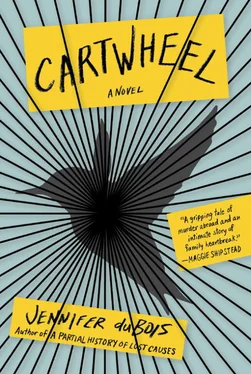Lily had made a philosophical decision during sophomore year to refer to her dates in gender-neutral pronouns as much as possible, in solidarity with the gay rights movement. As it happened, all of her sexual partners (four to eight, depending on how conventionally one was defining the act) had thus far been male, but she wasn’t narrow-minded. She’d always imagined she might kiss a girl before college was out. She knew it was cliché, but one couldn’t always avoid being cliché. She was twenty, she was a double major in philosophy and women’s studies, and this much she’d learned the hard way.
“Right,” said Katy vaguely.
“Well, one person, mostly,” said Lily. “His name was Harold. He studied economics. I can’t believe I dated someone named Harold. I had sexual intercourse with someone named Harold. He’s twenty-one years old, can you imagine?” Katy’s eyes were flattening, maybe, a little. She zipped her suitcase back up, even though she hadn’t finished unpacking. “What was your boyfriend’s name?” said Lily.
“Anton.”
“Anton, see?” Lily sat on the bed. “Now that’s a name.”
“I really loved him.” Katy breathed in quickly, and Lily was afraid, for a brief, harrowing moment, that she might cry. It was too soon, it was far too soon, for this conversation.
“Well, sure,” said Lily soothingly. She swung her feet back onto the bed and tucked them under herself. “Are you guys still friends?”
“No,” said Katy uncomprehendingly. “We’ll never be friends.”
“No?” This was a matter of some interest to Lily; when she and Harold had broken up, they had solemnly vowed to stay friends. And why wouldn’t they? They were both young and resilient and had had their hearts broken two or three times already. But soon he’d taken up with a new girl—an accounting major, please!—who’d forbidden him ever to speak to Lily again. This she found crushing; she had very much wanted to stay friends with him, partly because being friends with ex-lovers seemed sophisticated and mature and continental, and partly because it seemed humane, and partly because she harbored a catastrophic fear of losing touch with anyone. It reminded her of death, and she was too easily reminded of death already. Then again, she knew that she had a more acute sense of the passage of time in general—and the swiftness of life, in particular—because of her dead sister, or almost-sister, or whatever. So she’d learned to forgive people their shortsightedness, and be happy for them that they’d lived the kinds of lives that would allow it.
“He cheated on me at a substance-free house party,” said Katy.
“Oh geez.” Lily whistled. “That’s bad. You definitely want substances involved in infidelity.”
Katy looked stricken. “I don’t know,” she said doubtfully. “I’m not sure that really matters.”
Lily tried to backpedal. “No, of course,” she said. “But I mean, I don’t know. I don’t really think monogamy is natural for people our age, do you?”
Katy scratched her nose. Somehow this, even this, looked delicate, preordained. “Well,” she said. “I think maybe you can decide it is.”
Overall, Lily knew, the roommate situation could have been a whole lot worse. Katy was neat and polite and she quickly acquired a collection of reasonable girl friends with flatironed hair—none of whom were as beautiful as she was, but all of whom seemed about as nice—and went out with them almost every afternoon. Still, Lily couldn’t shake a feeling of deflating uneasiness—a kind of awkwardness, but with harder edges—whenever she was around Katy. Lily spent hours after classes ended drinking wine in cafés and reading Borges in Spanish, circling all the words she didn’t know, and when she returned to the Carrizos’ house at night—unhinged and awestruck, rapturous over the scope and beauty of the world—she’d sit down at the dinner table and Katy would say something like, “Lily, you have wine on your teeth.” And that would be that.
Still, Lily loved Buenos Aires; she loved to think of the vast meat of the world—ocean and Amazon and rain forests and drug wars—that separated her from everyone she had ever known. She couldn’t help but feel a little sorry for all of them, now that she was so happy. In her psychology class at Middlebury, Lily had once been assigned to write about birth order in her family and how she felt that she did or did not conform to the postulated birth order personality types discussed in class. Lily had written about how she was technically the oldest, and in some ways she felt like the oldest—she was maybe more adventurous than Anna—but in other ways, she felt like the middle child, because she certainly was lost in the shuffle between the needy poles of Anna (the baby) and dead Janie (also, perpetually, the baby), but in other ways, absent Janie only reconfirmed Lily’s status as oldest, because no first-time parents could be as paranoid or restrictive or dictatorial as second-time parents who’d lost their first. And Lily, of course, had had to break them down, remind them that not all colds were terminal illnesses, and not all broken curfews were catastrophes, and not all boys were rapists—you’re welcome, Anna!—and eventually they’d come to some mutual uncomfortable agreement that they were willing to let Lily have something like a life, though they didn’t have to like it.
She’d gotten an A on the paper.
But in Buenos Aires, for the first time, Lily felt herself stepping out of those roles; she felt herself finally filling out the template of her own autonomous selfhood that she now knew she’d been mapping—in secret, on her own time—for her entire life. Each day after classes—which were academically comical, everybody dead-eyed and hungover, the teachers bored, the classrooms too hot, the city shimmering right outside the window—Lily went wandering out into the enormous afternoons. She took epic, dusty walks around the city, to San Telmo and La Boca and Palermo, hopping in cabs to skirt the bad streets. She spent an afternoon trying to photograph a certain beam of light on the obelisk. She spent a day taking the train out to the basilica in Luján to try to see what all the Catholic fuss was about. She sat in bars drinking Quilmes and trying to look mysterious; she sat in cafés eating alfajors and licking powdered sugar off her fingers and not minding that she looked silly.
She would be dead one day, but she was not dead yet.
Around her, the air was humid, languid; it made all the other air she had ever known feel thin. Something about the lushness of the city made Lily think of prehistoric times—she half-expected to see a dinosaur with mossy teeth emerge from a swamp. The mosquito bites gave her enormous welts because she wasn’t used to Argentinean mosquitoes; they rose and grew and burst, volcanically, horrifyingly, and then healed into thumb-sized dust-colored scars. Lily documented this entire process on her camera, using American coins for scale. The bugs here were ridiculous, but everything here was ridiculous. The exchange rate was ridiculous. The fruit was ridiculous. Lily took pictures of the bugs and the fruit. She took pictures of the people, too, and sent them back to Anna.
“Do people mind you taking pictures of them?” said Katy.
“I don’t know,” said Lily. “I didn’t ask.”
For the most part, Lily loved the Carrizos, too. She got along very well with Carlos: The two of them drank the most at dinner, and got into good-natured rollicking screeds about George W. Bush during which they congratulated each other on a series of ever-more-implausible theories and opinions. Beatriz was sweet, in a no-nonsense sort of way—and, though she was possessed of a clear preference for Katy, Lily did not like Beatriz any less just because she liked Katy better. It was fine to have each host parent prefer a different study-abroad student. It made them all feel like a convincing temporary family.
Читать дальше












